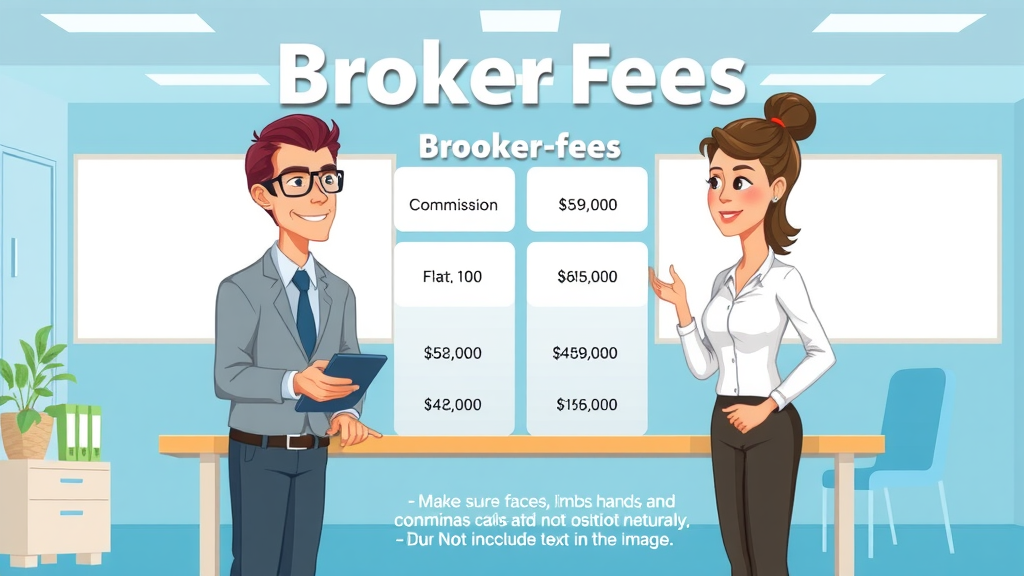Have you ever wondered just how much broker fees in property sales can impact your home sale profits ? Here’s a shocker: broker fees can eat up as much as 6% of your final sales price —often the largest single expense for sellers after their mortgage. Understanding these fees isn’t just about knowing the numbers. It’s about gaining the leverage to negotiate, save money, and secure the best possible price for your property. In this comprehensive guide, we'll demystify broker fees, reveal what really drives commission rates, and equip you with smart strategies to reduce your closing costs—ensuring you keep more of your equity when selling a home.

- You'll learn:
- What broker fees in property sales consist of
- How real estate agent and estate agent fees differ
- What impacts broker fees and commissions
- How to negotiate agent fees and broker fees
- Strategies to reduce your overall closing costs
“Did you know broker fees in property sales can account for up to 6% of your final sale price? Understanding every detail puts you in control of your home sale's outcome.”
Understanding Broker Fees in Property Sales: Why It Matters More Than You Think
Whether you’re a first-time seller or a seasoned property investor, getting to grips with broker fees in property sales can make a massive difference to your financial outcome. Broker fees—sometimes called agent fees or real estate commission —often determine how much you actually pocket from a home sale after closing costs are deducted. For many sellers, these fees feel fixed, but there’s far more at play behind the scenes.
Unlike other service charges in real estate transactions, broker fees are usually tied directly to the success of your sale—they’re generally a percentage of the sales price and can significantly impact your net profits. Real estate agents and estate agents may use various models for their commission fee , such as percentage-based or flat fee structures. These choices affect your bottom line, especially in markets where sale prices are high or where competition among real estate agents is fierce. By understanding exactly how these fees work, you can actively negotiate, compare, and choose the right real estate broker or estate broker for your unique scenario, maximizing the money you keep after your home is sold.
What Are Broker Fees in Property Sales? Defining Real Estate Agent and Estate Agent Commissions
At their core, broker fees in property sales are payments made to real estate agents, estate agents, or brokers for facilitating the sale of real estate. These fees compensate professionals for the extensive work they perform—marketing a property, coordinating with potential buyers, negotiating offers, and ensuring a smooth closing process. Knowing exactly what constitutes agent fees and commissions can help you avoid common pitfalls during a real estate transaction.
Typically, agent commission or realtor fees are set as a percentage of the final sales price . However, models can vary; some agents charge flat fee arrangements, while others may include additional service-related costs. Commission rates are usually agreed upon before the home hits the market and are spelled out in a listing agreement. Both the listing agent (representing the seller) and the buyer’s agent (representing the potential buyer) receive a share of this commission fee, ensuring all parties in the real estate transaction are incentivized to close the sale.
Types of Broker Fees in Property Sales: Commission Fee, Agent Fees, and More
Broker fees aren’t always limited to traditional sales commissions . Depending on your agent and market, you might encounter a variety of fees, such as administrative charges, marketing fees, or flat fee options. The classic commission fee is often 5% to 6% of the home’s sale price and covers the bulk of services involved in selling a home . This commission is usually divided between the listing agent and the agent representing the buyer, ensuring both work collaboratively.
In contrast, some flat fee brokerages offer a fixed rate—often attractive for sellers looking to keep their closing costs lower. Additionally, a few agents may charge a retainer upfront, or tack on fees for premium marketing, professional photography, or staging. It’s essential to ask for a comprehensive breakdown of all broker fees and agent fees before signing any agreements so you know exactly what services you’re receiving for your money.

How Broker Fees in Property Sales Affect Buyers and Sellers
Broker fees primarily impact sellers, but the ripple effects are felt by buyers and sellers alike. For sellers, these fees reduce net proceeds. For example, if you sell your home for $400,000 and incur a 6% total commission fee, you’ll pay $24,000 in real estate agent fees . These costs must be considered when setting your asking price and calculating your final profit from the home sale.
Buyers, while not typically paying broker commissions directly, may be affected by the structure of the deal. In competitive markets, agents might build commission expectations into negotiation strategies, which can impact a buyer's leverage or influence the ultimate sales price. Both real estate agents and estate agents play crucial roles in ensuring that all parties are aligned, transparent, and fully informed about who pays what at closing.
| Fee Type | When It's Charged | Typical Amount | Who Pays? | Key Considerations |
|---|---|---|---|---|
| Broker Fee | At closing | 5%–6% of sales price | Seller (usually) | May be negotiable; split with buyer's agent |
| Estate Agent Commission | At closing | 4%–6% of sales price | Seller | Varies by location & type of agent |
| Realtor Fees | At closing | 5%–6% of sales price | Seller | Represents full-service agents who are members of the National Association of Realtors |
| Flat Fee | Upfront or at closing | $1,000–$5,000+ | Seller | May not include all services; best for confident sellers |
How Are Broker Fees in Property Sales Calculated?
Broker fees in property sales are commonly calculated as a percentage of the final sales price —typically ranging from 5% to 6% for standard agent fee or commission structures. However, alternative models, such as flat fee arrangements or hybrid combinations, are gaining popularity, especially in competitive real estate markets. It’s key for sellers to understand how different commission structures influence both their expenses and the incentives their agent has to sell the home efficiently.
With percentage-based fees, the higher your home’s sale price, the more your agent earns. Flat fee arrangements, on the other hand, offer clarity and predictability, regardless of the home’s value. The right choice often depends on your confidence in managing certain parts of the real estate transaction yourself and your specific goals for the sale. Always discuss these details at the listing appointment to ensure total transparency.

Percentage-Based Broker Fees vs. Flat Fee Arrangements
Most traditional real estate agents prefer percentage-based commission fee structures, as these align their compensation with the home sale price and incentivize them to maximize your sale. But this model isn’t always the right fit for every seller. Enter the flat fee agent or broker: instead of a commission, you pay a predetermined amount, no matter the final sale price.
Choosing a flat fee broker arrangement can be a smart move for more experienced or budget-conscious sellers. However, these models often require sellers to take on certain responsibilities, like marketing or open houses, that are traditionally handled by a full-service agent. On the other hand, a percentage-based commission ensures the agent is fully invested in getting you the highest possible offer, as their earnings depend on it. Weigh the pros and cons of both to determine which arrangement matches your comfort level, budget, and sale strategy.
What Goes Into Real Estate Commission and Agent Commission Structures?
The factors that determine real estate commission and agent commission structures are varied. Standard commission rates reflect local market conditions, the agent’s reputation, and the level of service offered. In most cases, the total fee is split between the buyer’s agent and the listing agent, providing an incentive for both to bring about a successful sale.
Other elements—such as marketing budgets, listing fees, transaction coordination, and even agent overhead—are often baked into the final agent fee . For full-service real estate agents, the commission covers everything from professional photos, advertising, staging, showings, negotiations, and closing paperwork. Before signing any listing agreement, make sure you know exactly what services are included in your broker fee .
"Understanding broker fees in property sales helps sellers avoid unexpected closing costs and maximize profits."
Key Factors That Influence Broker Fees in Property Sales
No two broker fee structures are alike. Several critical factors influence how much you’ll pay in broker fees in property sales . The local real estate market, each agent’s experience and reputation, the complexity of your property, and unique agreements all play a role. Recognizing these factors empowers you to negotiate wisely and make informed decisions while selling a home.
Let’s explore the key components shaping estate agent commissions, agent fees, and the total cost to sell your property.
Market Trends in Real Estate and Their Impact on Broker Fees
The ebb and flow of real estate markets directly affects broker fees . In highly competitive seller’s markets—with lots of potential buyers and low inventory—agents may be willing to accept lower commission rates, as homes often sell quickly. Conversely, in slow markets, agents might secure higher fees to cover the extra time and effort needed to market and close a sale.
National and local trends, as reported by organizations like the National Association of Realtors , set the tone for what’s considered a “normal” commission fee. Staying informed about real estate trends helps you understand when it’s possible to negotiate lower commission structures or secure a flat fee agreement for your specific estate transaction.

How Experience and Reputation of Real Estate Agents Affect Fees
Experience and reputation are key drivers of fee structures in property sales. Highly regarded real estate brokers and estate agents often command higher commissions, reflecting their track record of successful sales and client satisfaction. While it may seem tempting to pick the lowest-cost agent, remember that paying a premium can translate to better marketing, wider buyer networks, and expert negotiation—often delivering a higher sales price or a faster closing that more than covers the extra broker fee.
If you’re selling a unique or luxury property, you may also benefit from an experienced agent’s specialized skills and connections, making the extra commission an investment rather than a cost. Always check agent reviews, look for verifiable results, and ensure you’re comfortable with the balance of cost versus expected value.
Role of Location and Property Value in Estate Commission and Agent Fees
Your property’s location and its expected sales price also directly influence agent commission rates and estate commissions . High-value homes in expensive areas may attract lower commission percentages, given the higher earning potential despite a smaller rate. In contrast, agents selling lower-priced homes or properties in less desirable neighborhoods may negotiate higher commission rates to compensate for the additional time and effort required.
Additionally, local norms, state regulations, and competition among real estate agents can affect both the availability and flexibility of negotiated brokerage fees. Understanding what’s common in your area—through local real estate associations or by interviewing multiple agents—can help you secure the best deal for your situation.
"Reputable real estate brokers may charge higher commission, but their expertise often leads to a quicker, higher-value home sale."
Ways to Negotiate Broker Fees in Property Sales
Contrary to popular belief, broker fees in property sales are rarely fixed in stone. Most real estate agents expect some negotiation, especially when sellers are well-informed and prepared. Key factors like your property’s easy marketability, your willingness to share in some sales responsibilities, or your research into competitive agents in your area can all be used as bargaining chips.
Effective negotiation starts with respectful, open dialogue, and a willingness to understand both parties’ needs. Getting multiple quotes, requesting detailed fee breakdowns, and demonstrating the unique selling points of your home can all lead to a more favorable deal.
How to Approach Estate Agents and Real Estate Brokers About Lower Fees
The most effective way to negotiate broker or agent fees is through clear, compassionate communication. Instead of demanding a lower rate outright, ask for a detailed itemization of all costs: commission fee, administrative charges, marketing expenses, and any additional agent fees . Then, discuss your expectations around service quality and marketing efforts relative to the commission paid.
Point out aspects of your home sale that may make things easier for the agent, such as its location, your flexibility in showings, or existing curb appeal. These can justify a reduced commission or a partial refund of certain fees at closing—especially if you’re willing to sign a short-term exclusive agreement or offer reputable referrals in the future.
Tips for Negotiating Agent Fees Without Compromising Service Quality
Securing a fair deal on broker fees shouldn’t come at the expense of top-tier service. Focus negotiations on areas where your agent is comfortable giving ground. For example, requesting a flat fee for listing services while using an a la carte menu for extras like open houses or professional photography keeps costs lower but maintains service quality.
Always compare at least three real estate agent quotes, making sure to factor in their marketing, network reach, and skill at closing deals. Remember, the lowest fee isn’t always the best—opt for a reputable agent who combines a reasonable cost structure with a proven ability to produce stellar results.
- Effective strategies for reducing broker fees in property sales:
- Request a breakdown of all agent fees and commission
- Consider a flat fee agreement
- Shop around for multiple real estate agent quotes
- Highlight the strengths of your home sale to negotiate lower commission

Alternatives to Traditional Broker Fees in Property Sales
With changing technologies and evolving consumer expectations, sellers now have more options than ever to cut broker fees in property sales without sacrificing results. Alternatives include engaging flat fee brokers , discounted commission models, or even online-only estate brokers. Each model offers distinct benefits for sellers willing to take on a more active role or who have straightforward sales.
Flat fee models are especially attractive for experienced sellers or those confident in the ease of selling their home, while online estate agents offer digital-first solutions with reduced personal interaction, often at the lowest cost.
Flat Fee Brokers vs. Percentage-Based Real Estate Agents
Choosing between a flat fee broker and a traditional percentage-based agent comes down to your risk tolerance and needs. Flat fee brokerages typically offer a menu of services at a defined upfront cost—ideal if you’re comfortable managing marketing, showings, and offers.
Percentage-based real estate agents may provide a more hands-on, consultative experience, ensuring you get the best deal through superior negotiation and broader buyer reach. Consider the complexity of your transaction and your own expertise before deciding which path suits you best.
When to Hire an Online Estate Broker for Your Home Sale
Online estate brokers have disrupted the market for property sales by offering streamlined, technology-driven services at a fraction of traditional costs. They are best for sellers who want a simple, cost-effective route, value digital convenience, and have a property that’s easy to sell without extensive hands-on marketing.
Keep in mind that while these brokers can save you thousands in fees, they may also provide less support, limited in-person service, and potential challenges in complex negotiations. Always read reviews, compare service packages, and ensure you understand what’s included in their agent fee before committing.
| Model | Pros | Cons | Best For |
|---|---|---|---|
| Flat Fee | Predictable cost, lower fee, pay only for needed services | May lack full-service, DIY marketing required | Experienced sellers, straightforward properties |
| Percentage-Based | Full service, incentive for higher sales price, support in negotiations | Can be higher overall cost | Sellers seeking expertise, specialized help |
| Online Broker | Lowest fees, digital convenience, broad reach | Less personal service, variable negotiation skills | Tech-savvy sellers, easy-to-market homes |
All Closing Costs Explained: Broker Fees, Agent Fees, and More
Broker fees are just one piece of the puzzle when it comes to closing costs in property sales. Sellers should budget for other expenses, including title insurance, legal fees, transfer taxes, and home warranties. It’s vital to know what’s included in your closing cost, which items are mandatory, and which are potentially negotiable.
Identifying every cost associated with a real estate transaction can prevent last-minute financial surprises, ensuring you walk away with the highest net proceeds possible after your home sale .
Common Hidden Costs in Real Estate Transactions
Beyond obvious agent commissions, there are several often-overlooked fees in a typical estate transaction . These include administrative fees, wire transfer charges, repair negotiations, and pro-rated property taxes. Because these costs can quickly add up, always request a detailed settlement statement well before closing.
Awareness of these “hidden” costs will help you set a more accurate budget and negotiate with confidence, ensuring no unwanted surprises when the sale closes.

The Impact of Broker Fees on Final Home Sale Proceeds
Ultimately, every dollar paid in broker fees or agent commissions comes directly out of your proceeds from the sale. That’s why it’s vital to factor in all expected fees—and their negotiability—when you’re calculating how much you’ll net from selling your home. Even small reductions—say, negotiating a 4.5% commission instead of 6%—can mean thousands in savings.
Armed with this knowledge, sellers can set realistic listing prices, prioritize their remaining budget for repairs or upgrades, and choose the broker or agent who aligns best with their value expectations.
People Also Ask: Answers to the Top Broker Fees in Property Sales Questions
What is a typical broker fee?
- A typical broker fee in property sales ranges from 5% to 6% of the home's sale price, though this can vary based on location, property value, and the agreement with your real estate agent.
What is a reasonable brokerage fee?
- A reasonable brokerage fee is one that reflects the current real estate market, the services provided, and the agent’s expertise. Usually, this means fees between 4% and 6% are considered fair and competitive.
Is the 3% broker fee high?
- A 3% broker fee is actually on the lower end and is often found in markets with high property values or where negotiation is common. It is not typically considered high.
What percentage do most real estate brokers charge?
- Most real estate brokers charge about 5%–6% as their commission on property sales, split between the buyer's and seller's agents.
Expert Tips for Minimizing Broker Fees in Property Sales

- Ways to minimize broker fees:
- Seek recommendations for agents willing to negotiate
- Understand every component of agent fees before signing
- Use market data to your advantage
- Consider selling a home with a limited-service estate broker
Frequently Asked Questions About Broker Fees in Property Sales
- Can broker fees be tax deductible?
- Who actually pays broker fees in a home sale?
- Are broker fees regulated by law?
- How do agent fee structures differ for buyers and sellers?
Maximizing Value: What Every Seller Should Consider About Broker Fees in Property Sales
"When you understand broker fees in property sales, you're equipped to make choices that maximize your profit and minimize unnecessary costs."

Take Control of Your Home Sale: Make Smart Decisions About Broker Fees in Property Sales
Ready to maximize your home sale proceeds ? Start by comparing agent quotes, demanding clarity on broker fees in property sales , and negotiating the terms that fit your needs. Knowledge is your best bargaining chip—use it to secure the best deal and walk away from your sale with more money in your pocket.
 Add Row
Add Row  Add
Add 




Write A Comment